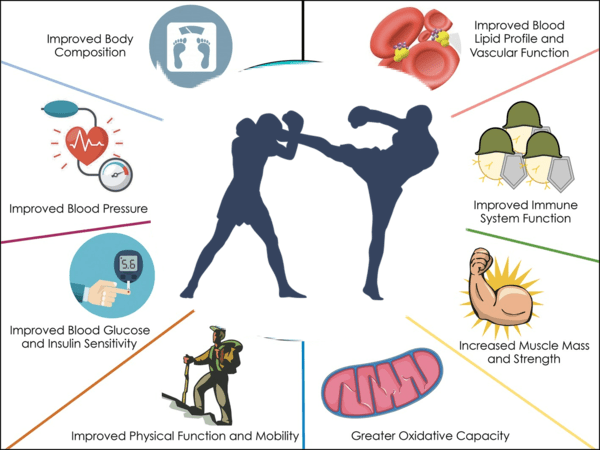The journey towards weight loss requires exercise and diet to work synergistically. Following a strenuous cardio workout without a well-structured kickboxing diet to lose weight causes hindrances in your journey towards a healthy life.
While incorporating kickboxing into our routine we must ensure that the body receives adequate fuel and water for such a high-intensity workout. A well-balanced kickboxing diet to lose weight must include the right proportion of carbohydrates, proteins, and fats to facilitate fat-burning and muscle toning.
However, by embracing the power of an effective kickboxing diet to lose weight, we can not only shed unwanted pounds but also attain a remarkable nutritional balance, and physical health. The strenuous nature of kickboxing also helps us to channel our energy in the right place, releasing pent-up stress.
Kickboxing has various other health benefits including strengthening the immune system, improving cardiovascular health, and boosting mental resilience. The strenuous nature of kickboxing also helps us to channel our energy in the right place, releasing pent-up stress and tension.
Table of Contents
ToggleFueling Fitness with Kickboxing Diet
Kickboxing is an intense exercise involving knee and elbow strikes, kicks, punches, and footwork to strengthen the body muscles. If; practiced along with a well-structured kickboxing diet, one can also burn calories depending on a person’s age, gender, body weight, and health conditions.

Kickboxing Diet and Optimal Performance
The backbone of the synergistic relationship between kickboxing and weight loss is the well-balanced kickboxing diet.
- The kickboxing diet to lose weight should always have a higher proportion of protein as it is crucial for strength, growth, and repair of the muscles.
- A small portion of the kickboxing food diet must include healthy carbohydrates to maintain the energy levels required for kickboxing.
- Foods containing healthy fats like Omega-3 coming from natural sources like fish oils and olive oil should be added to the diet.
Optimal Kickboxing Schedule
Although cardiovascular exercise like kickboxing is beneficial for physical and mental well-being, but too much exertion can lead to problems like mental fatigue, hormonal imbalance, depleted energy level, and muscle-related injuries. Therefore; you should not practice kickboxing more than three times a week.
Pre-kickboxing Diet to lose weight
The driving force behind your kickboxing performance is your diet. So; it is essential to find the right balance between protein, carbohydrates, and fats. Imbalanced nutrition can lead to fatigue, muscle soreness, and zero motivation. It can also null and void the results of a kickboxing diet to lose weight.
The first question that comes to every beginner’s mind is, “What to eat before kickboxing to enjoy the benefits of kickboxing for weight loss?”
According to experts, if you want to maximize the kickboxing exercise benefits, then your pre-workout meal should have:
- The higher portion of complex and natural carbohydrates such as whole grains, oats, fruits rich in water content, and vegetables. You should avoid refined carbohydrates like sugar, cereals, white flour pasta, and white bread if you want to shed some pounds.
- A small amount of healthy mono-saturated fats should be added to the meal to fuel up your energy levels. Fats present in nuts, avocados, olive oil, and peanut butter serve as energy boosters to enhance your performance.
The pre-kickboxing meal should be consumed an hour or two before the practice session for better performance.
Post-kickboxing Diet for Recovery and Replenishment
After engaging in a hoard core cardio exercise like kickboxing, you should replenish your body with the proper nutrients that will aid in muscle recovery and enhance your physical capabilities.
Do you know what is the most effective post kickboxing diet to lose weight?
Nutritionists and martial arts experts suggest a protein-rich diet along with fruits and vegetables to meet nutritional and water needs. So, after kickboxing we should consume:
- A protein-rich diet along with fruits and vegetables to meet nutritional and water needs. It is preferred to choose any lean protein source including meat, chicken, turkey, fish, and tofu
- Plant-based protein sources like lentils, beans, or leafy vegetables.
- You can also consume a protein shake right after a rigorous exercise session to meet the protein requirements.
Take the post-kickboxing recovery meal 30 to 60 minutes after the session because at this time maximum nutrient absorption takes place.

How Hydration Fuels Kickboxing Performance?
For optimal performance in kickboxing, our bodies need to be properly hydrated due to their high-intensity nature. Dehydration can lead to:
- Fatigue and muscle-related injuries because there is a reduction in blood flow towards your muscles.
- Reduced stamina as water transports nutrients to the whole body.
- Loss of cognitive function as low water content can reduce brain activity thus impair focus, attention, and reaction time.
- Heat exhaustion, heat strokes, and other health-related conditions.
- Headaches, that will demotivate you affecting your performance.
It is necessary for an athlete to drink an adequate amount of water before and after the kickboxing sessions. A person involved in cardio exercise should take small sips of water throughout the day. Electrolyte drinks are also beneficial for maintaining the body’s water and nutrient content.
Kickboxing-A Pathway to Physical and Mental Fitness
There is a wide range of kickboxing exercise benefits. Some of these include:
All-in-one Workout
Kickboxing involves punches, kicks, knee strikes, and other martial art techniques. It is a high-intensity workout and targets muscles all over the body leading to better strength, flexibility, and weight loss.
Cardiovascular Fitness
The continuous movements during kickboxing lead to an elevation of heart rate. Cardio kickboxing benefits include:
- increased blood flow and circulation.
- increased cardiac output ensuring an efficient supply of blood and nutrients to the whole body.
- helps in the maintenance of normal blood pressure and cholesterol levels.
- reduced rate of life-threatening cardiovascular diseases like strokes, and heart attacks.
Weight Loss
During kickboxing, all the body muscles actively are involved in the activity. Thus, helps in toning up the body if followed along with a good kickboxing diet for weight loss.

Stress Relief
If you are looking for an activity to release your stress and frustration then kickboxing is the one for you. This strenuous exercise leads to the release of endorphins in the body which contributes to the mental well-being of the athlete.
Improved Coordination and Balance
The coordinated and defensive movements during the kickboxing session help in improving the athlete’s coordination and balance.
Self-Defense Skills
Kickboxing being a martial art teaches you enough self-defense techniques that help you in potentially dangerous situations.
Improved Respiratory Function
The rigorous movements involved in kickboxing result in deep breathing and lung expansion. This results in increasing oxygen intake and strengthening the respiratory system.
Coordination Between Mind and Body
Kickboxing helps you in developing a strong connection between your mind and body by focusing on neural coordination. Better mind-body coordination leads to a well-disciplined and mindful game.

Empowering Benefits of Kickboxing
Since the evolution of kickboxing, it has been a male dominant sport due to its intense energy requirements. But women empowerment has motivated women to break societal norms and participate in challenging martial arts sports.
Women need to be dedicated, consistent and follow a balanced kickboxing diet to lose weight and reach their goals.
Kickboxing Benefits for Males
There are countless kickboxing benefits for males. The most important is the release of built-up tension and frustration in a healthy way which in return reduces the rate of various social and religious crimes.
Importance of Balanced Lifestyle in Kickboxing
Any cardio exercise including Kickboxing is good for you only when you maintain a healthy and balanced lifestyle. For a successful kickboxing career, you need to focus on the following body requirement:
Balanced Sleep Cycle
Inadequate sleep can lead to reduced energy levels, impaired cognitive function, slow muscle recovery, and low motivation.
Balanced Hydration Level
Balanced hydration level because dehydration leads to fatigue and over-hydration leads to elevated sodium levels thus leading to the body’s dysfunction.
Embracing the Individuality of the Human Body
While accepting the importance of diet and determination behind an athlete’s success it is also necessary to embrace individuality and understand that everybody works differently. So, you should not rely only on the information you read from various internet sources.
To be a successful kickboxer one should get a proper diet plan from a nutritionist depending on your age, gender, body weight, and body’s health condition. You can also follow famous nutritionists including Precision Nutrition, and MyFitnessPal blog for a better understanding of kickboxing dietary requirements.
Joining a proper martial art training academy is preferable for optimal performance. To stay updated with the new training methodologies you can also follow famous Kickboxing trainers including Saenchai, Kaven Ross, and Kaley Reece on youtube.
Conclusion
In order to live a healthy life we need to incorporate exercise or sports into our life. Any cardio exercise such as kickboxing is good for your physical and mental well-being if; followed by a well-balanced diet. So let’s embrace a disease-free future by adding exercise to our lifestyle.
Frequently Asked Questions:
What muscles does kickboxing target?
Kickboxing targets all muscles of the body and plays a significant role in strengthening the upper body.
How effective is kickboxing for weight loss?
Kickboxing is a high-intensity cardiovascular activity. It can significantly elevate your heart rate and help you burn many calories during a session. The exact number of calories burned varies depending on your weight, the workout’s intensity, and the session’s duration.
What should you eat before a kickboxing session?
Before a kickboxing session, you should eat a healthy carbohydrate-rich diet along with fruits and healthy fats
Does kickboxing improve heart health?
Kickboxing is a cardio exercise that helps in strengthening the cardiovascular system. It also reduces the chances of cardiovascular disorders like strokes and heart attacks.